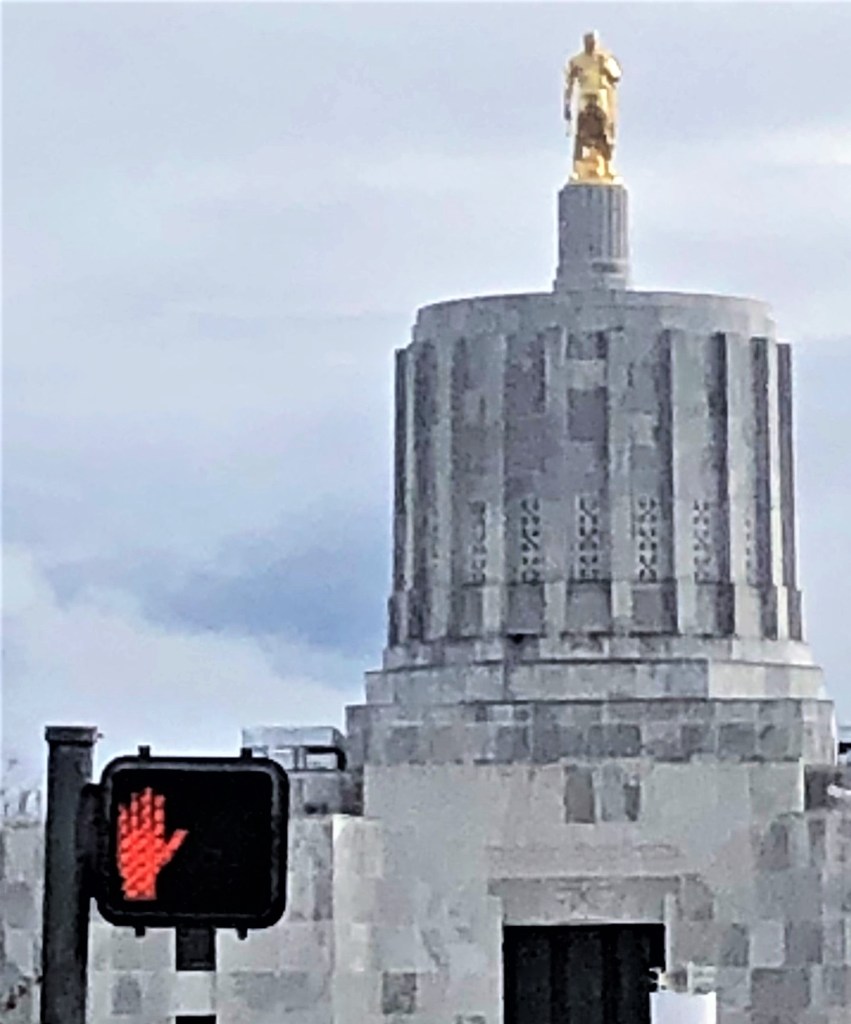Senate stuck in stalemate in session’s final days
Published 12:15 pm Monday, May 29, 2023

- A pedestrian stop sign at the Capitol in Salem, Oregon. June 25 was the equivalent of a stop sign for thousands of measures in the Legislature that hadn't received action up until the last day of the 160-day session.
Another week of the “new normal” in Salem begins Tuesday, with the Senate stalled since May 3 while the House seeks things to do in the meantime.
The calendar is a reality check for state lawmakers. As of Tuesday, May 30, there will be just 26 days left in the 160-day session authorized under the Oregon Constitution.
Trending
What began on Jan. 17 must end no later than June 25. More lawmakers are saying out loud what others have suggested for more than a month: the 2023 regular session of the Legislature is unsalvageable.
Sen. Jeff Golden, D-Ashland, an increasingly rare Democrat in what has become the solidly Republican southwest of the state, told the Oregonian last Thursday that a return of Republican senators was “a real longshot.” He suggested the need for Gov. Tina Kotek to call a special session by late June or early July to salvage the state budget was “extremely” likely.
Sen. Michael Dembrow, D-Portland, has sounded increasingly pessimistic in his always-frank Sunday night newsletter to constituents. The May 28 edition noted some early bipartisan successes in the Legislature on homeless relief and aid for the state’s semiconductor industry.
But beginning with the Republican walkout on May 3, lawmaking has come to a crashing halt.
Dembrow wrote Sunday that Republicans have blocked the required two-thirds quorum for the Senate to meet 17 times. But the true time loss is larger.
The constitutional calendar counts every day until the session must end – weekends and holidays included. Under that timeline, the Senate has not met for a floor session in 26 days, or about equal the number of days until it has to shut down.
Trending
Sanctions against senators come after session
Senate Minority Leader Tim Knopp, R-Bend, eight other Republicans and one conservative Independent who often aligns with the GOP have not been dissuaded from their boycott by likely penalties under a new state law.
Measure 113, approved by 68% of voters last November, would bar those with ten or more unexcused no-shows on floor session roll calls from from re-election.
The ballot measure’s language is sloppy enough in parts that the secretary of state’s office has asked for an official clarification of exactly when and how the ban would go into effect. Republicans say they will challenge the measure as an unconstitutional limit on voters’ choice of representation.
One area of agreement on all sides: Any change to the senators’ status would come long after the current session – and the 2024 session as well. If upheld, the absent senators could be kept off the May 2024 primary ballot. For senators elected in 2022, they wouldn’t face repercussions until May 2026 – their seats guaranteed through the 2023, 2024, 2025 and 2026 sessions.
Democrats say no to deadline deal
A GOP offer to come back for the final day of the 2023 session to pass a state budget and a few “bipartisan” bills has been flatly rejected by Democrats, for now.
“I can tell you that that is not going to happen,” Dembrow wrote Sunday. “It’s actually kind of ridiculous. It would be impossible to get all those bills through both chambers in one day, certainly not with the kind of debate one would hope to have for important legislation.”
Dembrow echoed Golden, saying that a continuing resolution passed earlier in the session would act as a bridge, keeping state funding for agencies and programs at current levels through September. Kotek “could and likely would reconvene us for a special session, simply to pass agency budgets before the new fiscal year begins on July 1,” he wrote.
A special session would require a restart on all legislation – state law does not allow bills to “roll over” into a different session.
“Many crucial policy, appropriation, and tax credit bills would be dead for this session,” Dembrow wrote.
Even if a “budget only” special session was held, the next regular session in 2024 would include the same line-up of lawmakers as today. That raises the specter of a renewed walkout in next year’s 35-day session. Republicans walked out of the 2020 “short session” over Democratic-sponsored carbon cap pollution legislation. Issued blocked in 2023 could face the same fate next year.
“Many would remain on hold until 2025,” said Dembrow, who previously announced he’ll retire at the end of the 2024 session.
Any change after that would be in the hands of voters in 2024 – either by electing majorities the Democrats have never reached in earlier elections, or by asking voters for a constitutional amendment to change the quorum to a simple majority. Following the 2020 walkout, then Senate President Peter Courtney, D-Salem, and Senate Majority Leader Ginny Burdick, D-Portland, called for a referral to voters to change the quorum quota in the constitution. Both lawmakers have since retired, and current leaders – including Kotek and Wagner – have demurred in advocating such a change.
Budget-writing and other busy work
The Legislature currently has enough business left in the 2023 session to give appearances of progress for at least another week or so. The Joint Ways and Means subcommittees made up of both Senate and House members, will report their proposed budgets to the full committee on Wednesday and Friday of the next two weeks. The state budget would be ready for all sides to examine by June 9. But the next step — sending the budgets to the House and Senate floor — are pointless without an end to the blockage of bills.
The Tuesday agenda of the Senate continues to fill with more bills sent by committees. There are now over 150 bills in the queue awaiting action, which is increasingly likely to not happen at all. Most are House Bills approved by that chamber and sent to the Senate. They range from controversial issues such as House Bill 2002, dealing with abortion access and transgender medical care. Also in the crush: House Bill 2005, a gun control package.
But the rest of the bills include those with bipartisan support or dealing with specific issues such as water reclamation or changes in licensure for professions. On the flip side, the House is down to fewer than 20 bills sent from the Senate prior to the walkout that can be voted on and if approved, sent to Kotek.
But the House session also underlined a problem of absent senators: A key bill to allow community colleges to offer bachelor’s degrees in nursing has been amended in the House Higher Education Committee. That means it needs to go back to the Senate for approval of changes, which won’t happen as long as the walkout lasts.
Democratic leaders continue to push GOP to return
The walkout began on May 3 as House Bill 2002 headed toward a final vote in the Senate, which would send it to Gov. Tina Kotek for her signature.
Democrats have a 17-member majority in the House, enough for the 16 votes needed to pass the bill.
But the 20-vote threshold of a quorum requires at least three Republicans to attend floor sessions. Sen. Chris Gorsek, D-Troutdale, has had an excused absence since prior to the walkout in order to deal with medical issues. That has allowed Republicans to keep two members on the floor and still hold the total under the quorum. Sen. Dick Anderson, R-Lincoln City, has attended all but one of the 17 floor sessions. Sen. David Brock Smith, R-Port Orford, returned to the Senate after compiling four absences.
Republicans say the issues driving the walkout also include clarity of language in legislative analysis and what they say is the majority Democrats shutting out Republican ideas for bills.
“President Wagner could end this peaceful, constitutional protest today and he is choosing not to,” Knopp said Wednesday.
Democratic activists and local politicians have spoken up more forcefully in recent days to complain the walkout is the minority Republicans are using the two-thirds quirk in the constitution to derail the will of the majority of lawmakers, as elected by voters.
“Our kids, our homes, and our environment depend on unfinished business in Salem,” said Deschutes County Commissioner Phil Chang during a rally last week in front of Knopp’s Bend office. “We need Senate Republicans to get back to work.”
New week, old divisions
Dembrow says the subject of Republican dissatisfaction has been a moving target with only one constant: Knopp’s personal animosity toward Wagner. The Republican leader belittled Wagner in words rarely heard from party leaders on the Senate floor.
Wagner is “untrustworthy, deeply partisan, and doesn’t have the necessary skills to run the Senate in a bipartisan fashion,” Knopp said in a statement in late November when Democrats chose the then-Senate majority leader as their choice for Senate president. Knopp’s litany has been expanded to referring to Wagner as “a political hack” who was pushing an “unlawful, uncompromising and unconstitutional actions.”
Wagner has responded in public with modulated statements aimed at Knopp’s goals rather than his person. Democrats note that The Leadership Fund, the Senate Republican political action committee, aided by the Better Balance in Salem PAC, made a major push to try to get the Senate to a 15-15 tie. Such a result which would have required a compromising Senate president or even a rotating position shared by both parties. Despite close races in three to four districts, Democrats ended up with a 17-13 majority, down one seat from the prior session.
Dembrow said Knopp’s “hyperbolic” attacks on Wagner were a result of that disappointment at the ballot box.
Wagner said the election campaign was over and voters had decided Democrats should continue to advance their agenda.
“If the voters wanted different policies, they would have voted that way,” Wagner said Thursday. “That is how a democracy works. The majority of the members here of this body campaigned on reproductive health care, on equal rights for all, on gun violence prevention.”
Session may be done, but not over for Democrats
Most Democrats are loath to publicly call the session a failure or suggest a special session with limits on what kind of bills Democrats would introduce might be required.
A daily barrage of statements and emails from lawmakers and groups supporting endangered legislation is sent out to the public and media. Lawmakers hold out hope that Senate Republicans will return in time for the majority to get their agenda back on track.
“With education, housing, drought relief, and other funding on the line, now more than ever, it’s critical Senate Republicans get back to work,” freshman Rep. Emerson Levy, D-Bend, wrote in a Friday message to constituents. “Republicans are also holding up critical investments, like record K-12 education funding for our schools. Unless Senate Republicans show up to work, none of this will pass.”
But Republicans continued to argue that Democrats were excluding minority party views from the legislation.
Sen. Suzanne Weber, R-Tillamook, is among the 10 who have surpassed the 10 unexcused absences that trigger the law that would bar them from re-election. Weber, a former House member who ran and won a Senate seat in November, said she wouldn’t be forced from office until January 2025 – if the law is upheld.
Her latest newsletter this week exuded calm.
“You can find me still working in committees on important pieces of legislation,” Weber wrote. “I am working hard to ensure your concerns are heard and understood here in Salem. Regardless of whatever is going on during floor sessions, I will continue to work on behalf of my constituents.”





